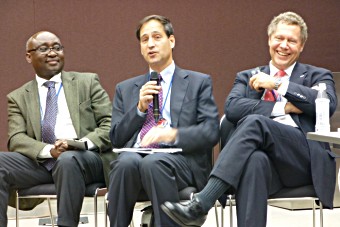
From left to right: Donald Kaberuka, President of the African Development Bank, David Bloom, professor of economics and demography at the Harvard School of Public Health, Seth Berkley, GAVI CEO
Tokyo, 12 October 2012 — Child immunisation has the power to fundamentally change the economic progress of developing countries even beyond the basic benefit of saving lives and improving health, according to rigorous, independent studies cited by Harvard economics professor David Bloom.
Bloom, a professor of economics and demography at the Harvard School of Public Health, was addressing a high-powered session at the World Bank-IMF meetings on Friday, which emphasised the importance of the economic link in helping government officials allocate scarce budget resources. Participants included finance, treasury and other top officials from Bangladesh, Italy, Japan, Kenya and Senegal, as well as Donald Kaberuka, President of the African Development Bank.
Cornerstone of a vibrant economy
“We used to think health was an indicator, not an initiator, of economic progress," said Bloom, "We now know that population health is a fundamental cornerstone of a vibrant economy… Health can move the economic metre very far and very fast.”
We now know that population health is a fundamental cornerstone of a vibrant economy... Prof. Bloom, professor of economics and demography at the Harvard School of Public Health |
This is a critical finding that can bring together health, finance and other ministries to a shared goal. The use of public funds for immunisation “must be credible from the point of view of economic ministers as well as health ministers,” said Geoff Lamb, President of Global Policy & Advocacy for the Bill & Melinda Gates Foundation, who moderated the discussion.
Link can mobilise finance ministers
The link between economic growth and immunisation is “a really powerful combination that can mobilise finance ministers,” agreed Carlo Monticelli, Director General of International Financial Relations in Italy’s Ministry of Economy and Finance. “It is an opportunity to leverage public money.”
Similarly, Tatsuo Yamazaki, Director General of the International Bureau in Japan’s Ministry of Finance, specifically cited the cost-effectiveness of vaccines in describing Japan’s decision to become a donor to GAVI last year, which was renewed in September.
Virtuous cycle
Cost effective it is, Bloom emphasised. Studies show that healthier children – spurred by immunisation – attend school more often, learn more while they are there and remain in school longer. As adults, they therefore are more productive, earn more money, save and invest more, and live longer. They also have fewer children, alleviating the “crushing burdens of youth dependency” on government budgets. Healthier children also mean less disease is spread through the adult population, further increasing productivity.
High octane fuel
“We know vaccines are cost-effective. But it’s more than that,” said GAVI CEO Seth Berkley. The virtuous cycle leads to other hard economic benefits.
Healthy populations are a “magnet to attract foreign investment,” Bloom noted, leading to increased trade, capital infrastructure projects and technological improvement. “Any intervention that improves health has follow-up economic benefits.”
A powerful argument then can be made to devote the economic windfall from a nascent energy sector in sub-Saharan Africa into public health, including immunisation, Kaberuka said. This could be a lynchpin in sustaining improvements in immunisation coverage rates once the economic performance of GAVI recipient countries improves enough for them to fully finance their vaccine programmes. (GAVI requires recipient countries to co-finance some portion of the vaccines it purchases.)
“Immunisation is a high octane fuel to economic benefit,” Bloom concluded. “We now have a compelling and powerful economic justification.”
